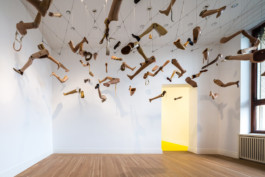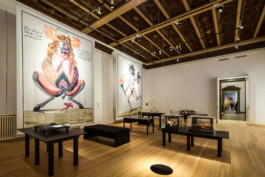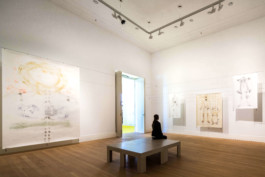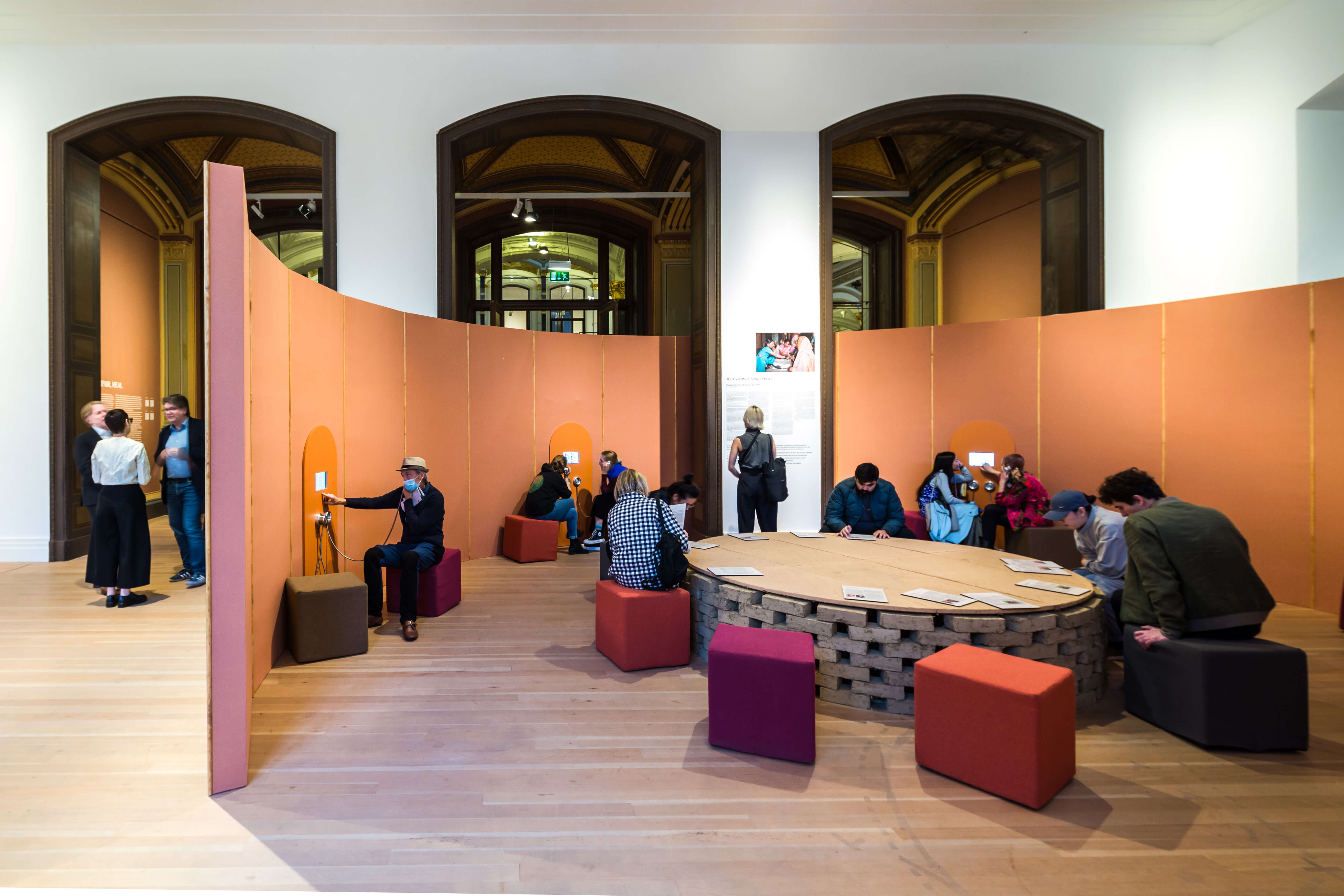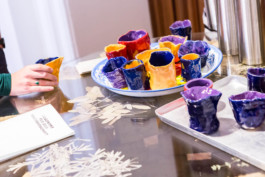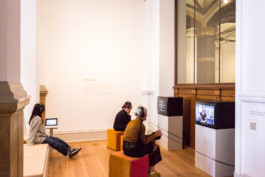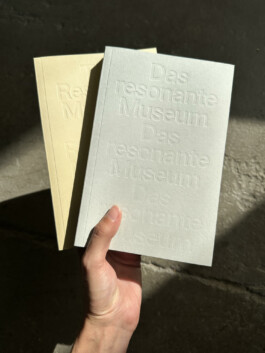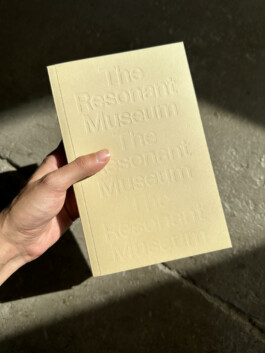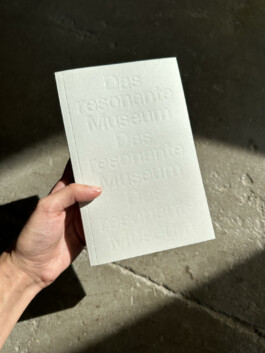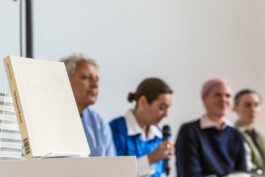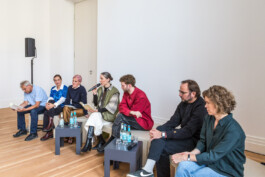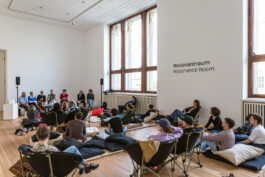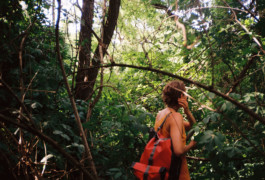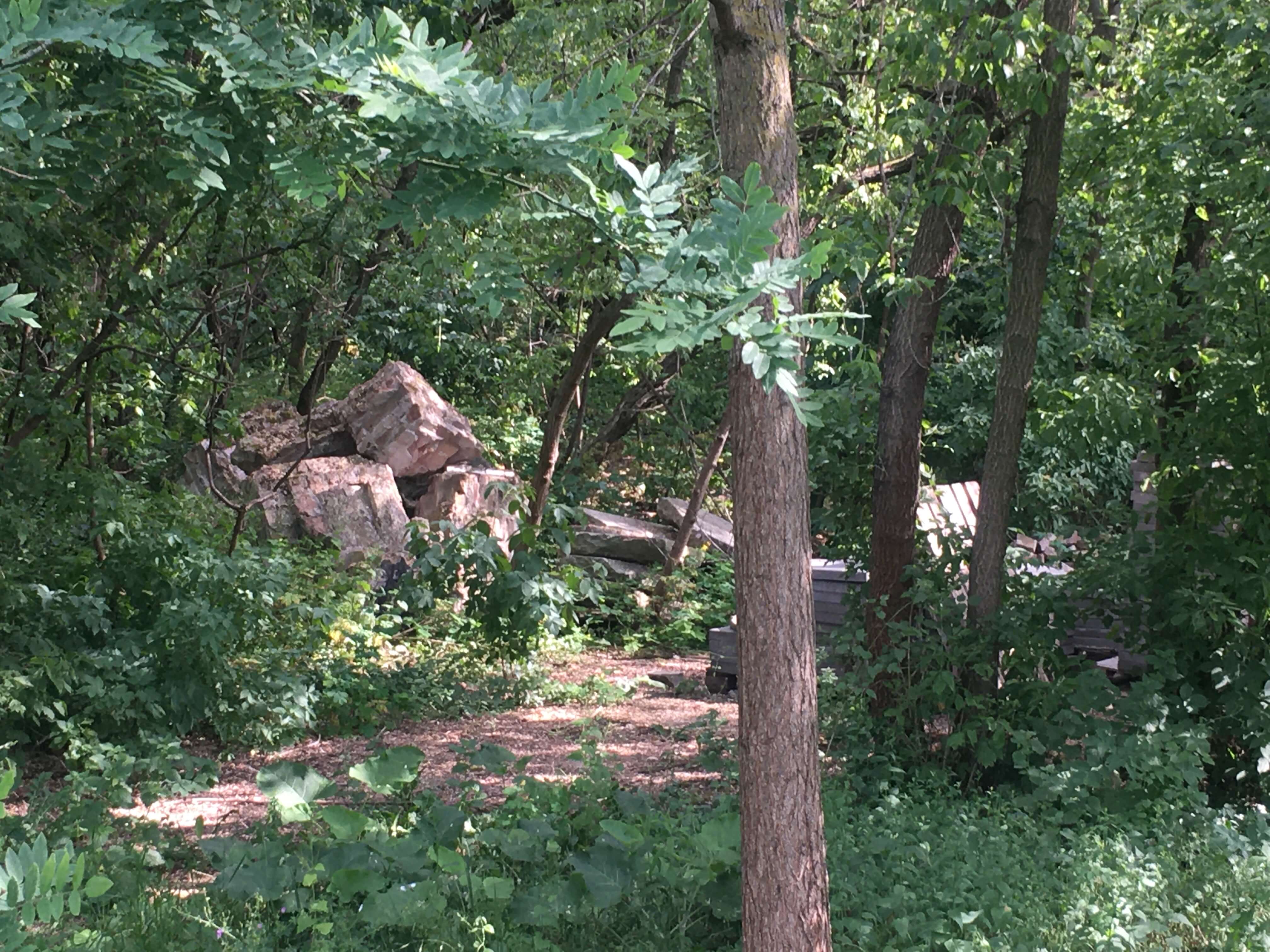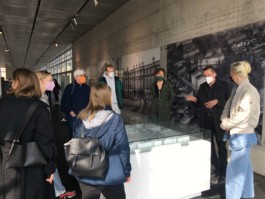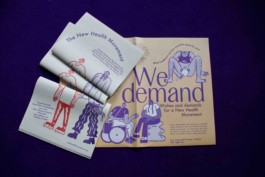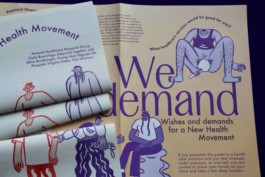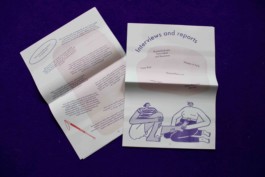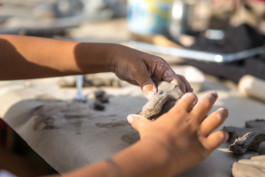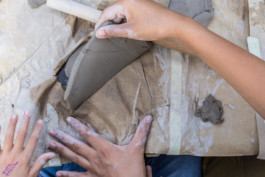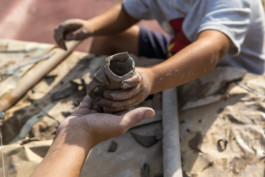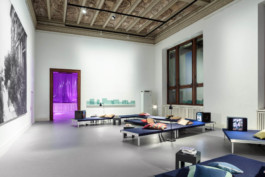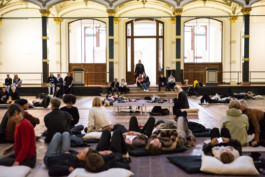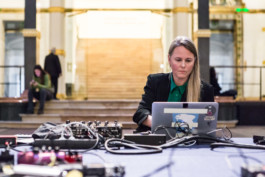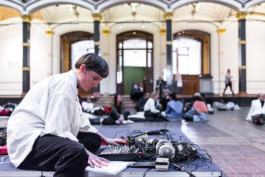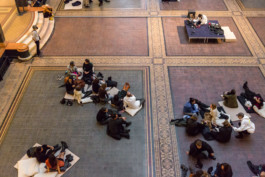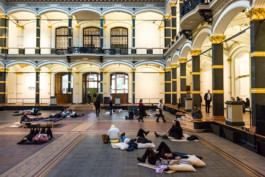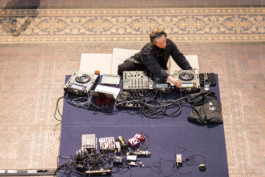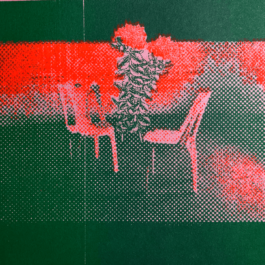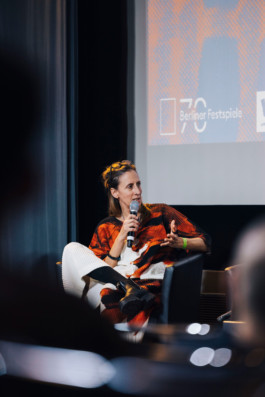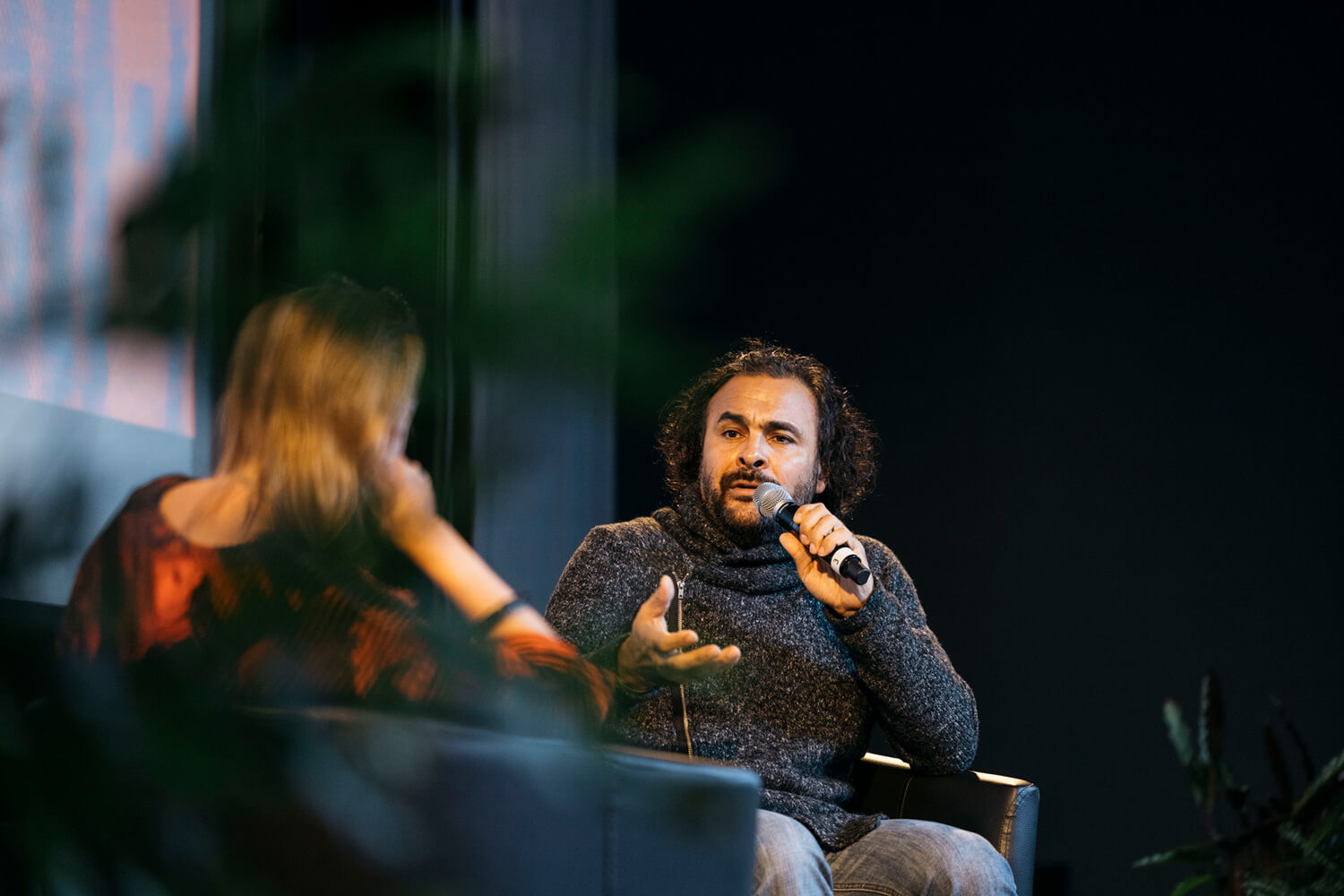In Berlin, Mindscapes worked through different projects and with different partners, but culminated in the Resonance Room. A section of the exhibition YOYI! Care, Repair, Heal held in the Gropius Bau (September 2022 to January 2023), the Resonance Room collected and shared local knowledge and experiences of mental health in Berlin. The different projects questioned the understanding of and approach to mental health in Berlin: how do individual health and society interact? How does history affect the present? Which forms of welfare and care, solidarity and community, are created and practised in urban society? The Resonance Room was conceived by Margareta von Oswald, Mindscapes’ cultural lead in Berlin, and Diana Mammana, lead of the Gropius Bau’s Community Projects. Mindscapes Berlin was realised thanks to a Wellcome grant awarded to Sharon Macdonald.
In Berlin, Mindscapes worked through different projects and with different partners, but culminated in the Resonance Room. A section of the exhibition YOYI! Care, Repair, Heal held in the Gropius Bau (September 2022 to January 2023), the Resonance Room collected and shared local knowledge and experiences of mental health in Berlin. The different projects questioned the understanding of and approach to mental health in Berlin: how do individual health and society interact? How does history affect the present? Which forms of welfare and care, solidarity and community, are created and practised in urban society? The Resonance Room was conceived by Margareta von Oswald, Mindscapes’ cultural lead in Berlin, and Diana Mammana, lead of the Gropius Bau’s Community Projects. Mindscapes Berlin was realised thanks to a Wellcome grant awarded to Sharon Macdonald.
2020–23
During his Mindscapes Berlin residency at Gropius Bau, Kader continued his research into repair, exploring the immaterial wounds that haunt German society. Kader is a French-Algerian artist and theorist whose previous sculptural, visual and theoretical works are inspired by the question of the visibility and invisibility of the wound.
16 September 2022 – 15 January 2023, Gropius Bau
Featuring the diverse and sometimes conflicting perspectives of 25 artistic positions, YOYI! Care, Repair, Heal addresses issues such as the politics of health, the resilience of Indigenous knowledge systems, forms of kinship, fair land use and its distribution, decoloniality and the rights of the non-human, all entangled with various concepts of care, repair and healing.
Curatorial team:
Brook Andrew, Kader Attia with Giscard Bouchotte, Natasha Ginwala, Bárbara Rodríguez Muñoz, under the curatorial lead of Stephanie Rosenthal in collaboration with SERAFINE1369, In House: Artist in Residence 2021
With works and contributions by Pierre Adler, Brook Andrew, Kader Attia, Tosh Basco, Mohamed Bourouissa, Andrea Büttner, Lavkant Chaudhary, Lygia Clark, André Eugène, Artemisia Gentileschi, Johanna Hedva, Jilamara Arts & Crafts Association, Anne Duk Hee Jordan, Eva Kot’átková, Betty Muffler & Maringka Burton, Grace Ndiritu, People’s Archive of Rural India, Outi Pieski, Paula Rego, Tabita Rezaire & Amakaba, Georgia Sagri, Yhonnie Scarce, Reginald Sénatus (Redji), SERAFINE1369 and Wu Tsang
part of the exhibition YOYI! Care, Repair, Heal
16 September 2022 – 15 January 2023, Gropius Bau
The Resonance Room shared local knowledge and experiences of mental health in Berlin. We developed a number of projects that questioned the understanding of and approach to mental health in this city: How do individual health and society interact? How does history affect the present? What forms of care, solidarity and community are designed and practised in urban society? The resonance of different voices from the neighbourhood, academia and civic society could be experienced here. As a meeting place, the Resonance Room gathered these voices and engaged them in dialogue.
Concept:
Diana Mammana, Margareta von Oswald
This project was part of the Neighbourhood Exchange at Gropius Bau, a project funded by the Beauftrage der Bundesregierung für Kultur und Medien.
Berlin Conversations on Mental Health
Edited by Diana Mammana and Margareta von Oswald
Verlag der Buchhandlung Walther und Franz König, 2023
The starting point for this book is the conversation on mental health. The conversations capture a specific set of circumstances in Berlin from the years 2021 and 2022. Interlocutors from the fields of science, culture and politics and activist contexts reflect on and articulate their experiences. They render one thing evident: speaking about mental health means also speaking about society.
These conversations emerged from a cooperation between the Gropius Bau and Mindscapes, Wellcome’s international cultural programme on mental health. Introductory texts discuss the processes through which museums can open up towards society and ask how these institutions can become socially relevant places capable of effecting change.
→ Link to book in German
→ Link to book in English
→ Download the German version here
→ Download the English version here
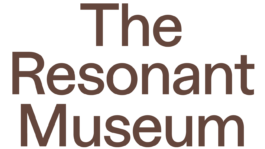
Design: studiO hAnli
In the summer 2022, we talked to 23 people in Berlin and asked them about their understanding of mental health. For us, addressing mental health was a way of investigating the fundamental aspects of living together. We especially wanted to learn about how mental health relates to social inequalities in the city. In this online film, you can explore what people answered to the question: In your wildest dreams, how would you imagine the future of mental health in Berlin?
Concept and interviews:
Margareta von Oswald, Nassim Mehran
Advisory board:
Kim Wichera, Lee Modupeh Anansi Freeman, Ulrike Kluge
Filming and editing:
Jan Stöckel
Production management:
Franziska Anastasia Lentes
Conversation partners:
Alina Georgescu, Andreas Heinz, Arno Deister,
Carolin Ochs, Felicia Boma Lazaridou, Inga Zimprich,
Julia Bonn, Kader Attia, Katrin Dinges, Kim Wichera,
Kirsten Schubert, Lee Modupeh Anansi Freeman,
Mandu dos Santos Pinto, Mazda Adli, Michael Bosnjak,
Niloufar Tajeri, Norma Kusserow, Pasquale Virginie Rotter,
Samie Blasingame, Tzoa, Ulrike Hamann, Ulrike Kluge,
Yasmin Merei
In the summer 2022, we talked to 23 people in Berlin and asked them about their understanding of mental health. For us, addressing mental health was a way of investigating the fundamental aspects of living together. We especially wanted to learn about how mental health relates to social inequalities in the city. In this online archive, you can explore conversations with different experts, talking about mental health in Berlin.
Concept and interviews:
Margareta von Oswald, Nassim Mehran
Advisory board:
Kim Wichera, Lee Modupeh Anansi Freeman, Ulrike Kluge
Filming and editing:
Jan Stöckel
Production management:
Franziska Anastasia Lentes
Conversation partners:
Alina Georgescu, Andreas Heinz, Arno Deister,
Carolin Ochs, Felicia Boma Lazaridou, Inga Zimprich,
Julia Bonn, Kader Attia, Katrin Dinges, Kim Wichera,
Kirsten Schubert, Lee Modupeh Anansi Freeman,
Mandu dos Santos Pinto, Mazda Adli, Michael Bosnjak,
Niloufar Tajeri, Norma Kusserow, Pasquale Virginie Rotter,
Samie Blasingame, Tzoa, Ulrike Hamann, Ulrike Kluge,
Yasmin Merei
Website design and development:
sTudio haNli
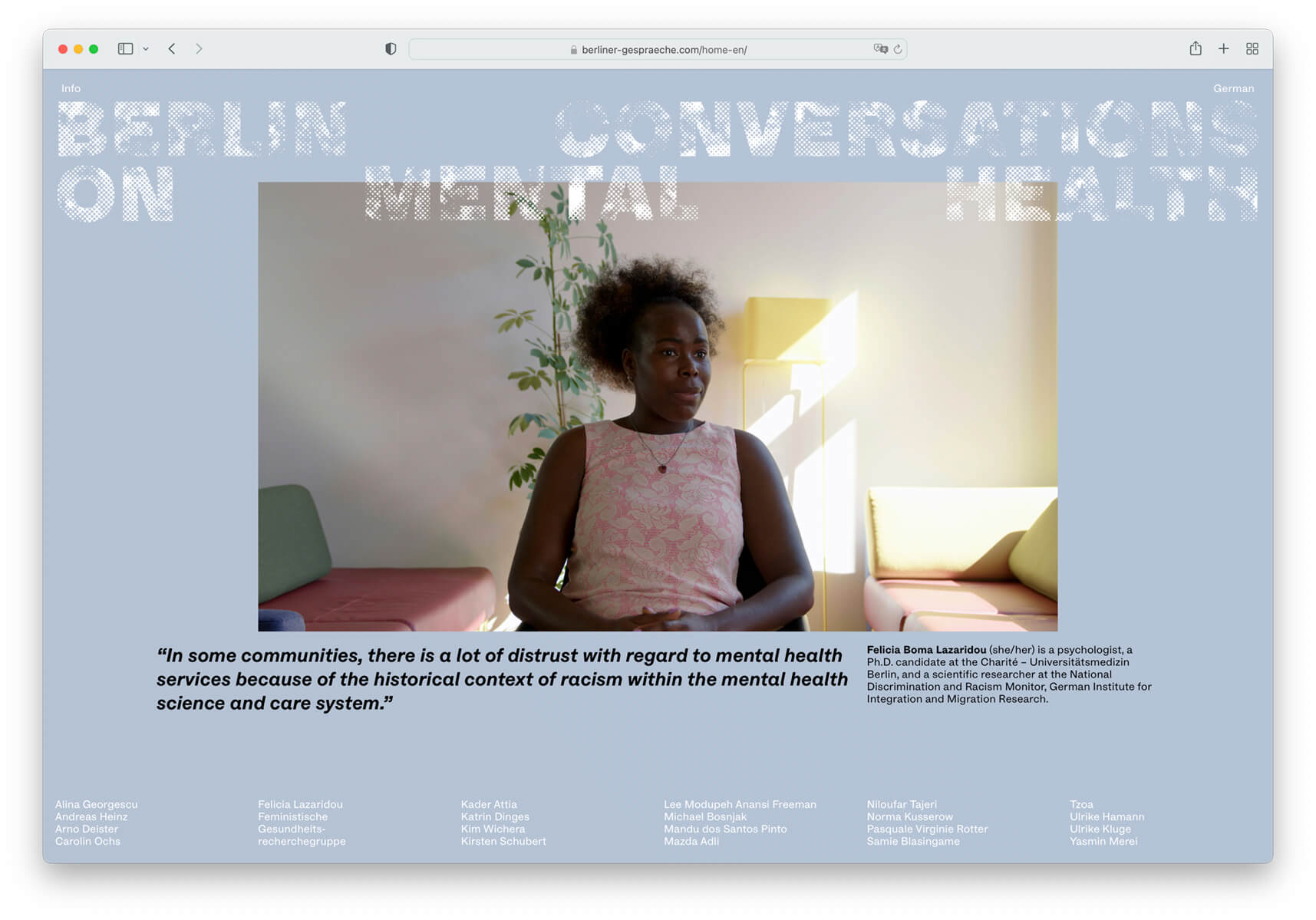
Music is a medium that helps foster and enhance desired states of feeling and embodied experience. From one moment to the next, music can make you feel good, uplifted — it can promote the temporary abatement of pain and deflects from debilitating energies and feelings. Intimate Connections engages with music’s capacity to help us cope and develop in manifold ways.
→ Listen here
Episodes:
→ Belonging with Michael Makembe and Injonge Karangwa
→ The Intervening Mind with Bitsy Knox
→ Inter.gen - sounds of rest, recovery and with KMRU + Ross Alexander
→ Fertile Ground with Edna Bonhomme
→ Parhelia with Lou Drago + Ligovskoï
→ raw audio with Nikolas Brummer
→ Something that holds with Vera Dvale
→ A riddim (lost in love) with Tapes
Concept:
Carl Luis Lange, Margareta von Oswald
Cooperation partner:
Cashmere Radio
Graphics and printings:
Carl Luis Lange, Kopierwerkstatt Cashmere Radio, DJ Shlucht
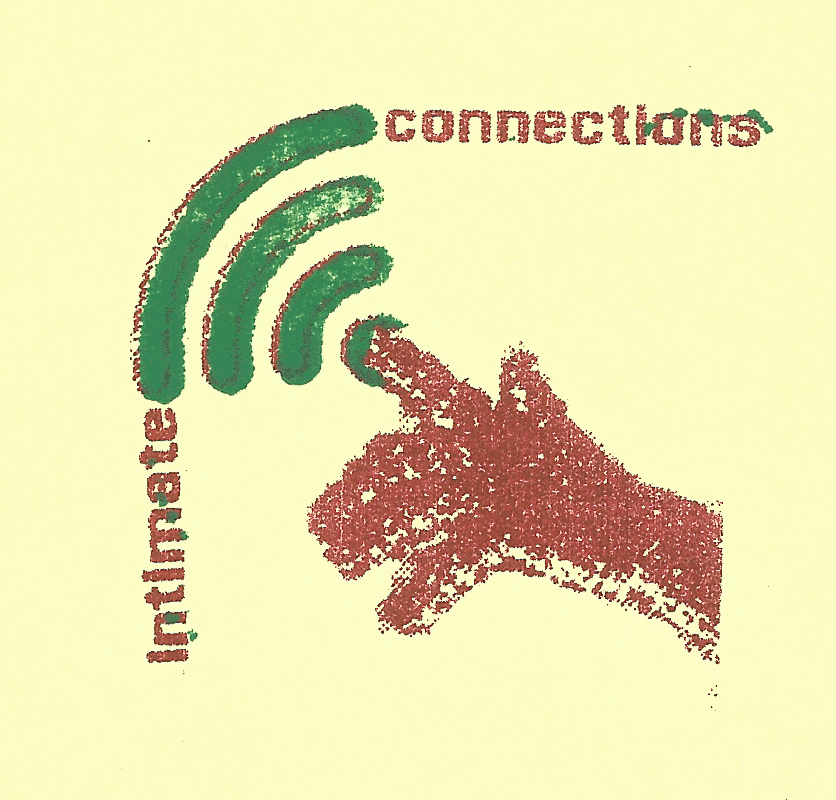
© Kopierwerkstatt Cashmere Radio
The Gropius Bau and its immediate surroundings are characterised by a multitude of histories. The building housed various institutions over time and is marked by the intertwining of the central violent regimes of the 20th century in Germany: colonial rule, Nazi dictatorship and the division of Berlin have left their traces here. The neglected ruin of the Gropius Bau is considered a sign of new beginnings in post-war Germany. In this audio walk consisting of three parts, students search for hints on how history and the present affect each other.
→ Audio tour: Invisibilities
→ Audio tour: Traces
→ Audio tour: Repair
Concept:
Diana Mammana, Margareta von Oswald
Production:
Carl Luis Lange
Participating persons:
Alissa Dovgucic, Carl Luis Lange, Christin Haubenreißer,
Emma Jelinski, Frederike Nolte, Lars Holdgate,
Mia vom Bruch, Monique Machicao y Priemer Ferrufino
In the project the New Health Movement, the Feminist Healthcare Research Group (Julia Bonn/Inga Zimprich) together with Alina Buchberger, Huong Nam Nguyen Thi, Pasquale Virginie Rotter, Kim Wichera gathered demands and requirements how the health sector needs to change to accommodate all people’s needs.
The zine presents interviews with Bundesfachnetz Gesundheit und Rassismus, Casa Cuà, Mine Pleasure Bouvar, <Platz da!> and Women in Exile and a report by RomaniPhen e.V. as well as questions, exercises and methods how to challenge the healthcare system today.
Personal and professional experiences on mental health from participants located in the neighbourhood around the Gropius Bau were exchanged and collected at regular meetings held over several months. You can find some outcomes of the conversations in the little booklet, that was part of the Resonance Room.
Concept:
Diana Mammana, Lea Hartung, Margareta von Oswald
Conversation partners:
David Buteyn, Dilay Dagdelen, Deiara Kouto,
Kerstin Kühn, Mary Buteyn, Maryna Markova,
Murat Dogan, Remzi Uyguner, Tim Ünsal,
Ulrike Koch, Veit Hannemann, Željko Ristič
This project was part of the Neighbourhood Exchange at Gropius Bau, a project funded by the Beauftrage der Bundesregierung für Kultur und Medien.
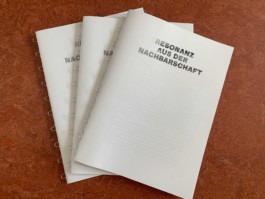
Design: studiO hAnli
2020–22
The exchange with Kreuzberg associations and
organisations was at the centre of conversations
about hospitality.
Conceptually, we were accompanied by the question
of how museums can become hospitable places and the
role one’s own wellbeing plays in this. The participants from
the neighbourhood around the Gropius Bau were actively
involved in producing the material basis of the Resonance
Room, for example the pottered teacups, the homegrown
herbal tea and the handsewn cushions. In this way personal
connections were created between the museum and the
everyday worlds of the participants.
Concept:
Diana Mammana, Margareta von Oswald
Cooperation partner:
Yeşil Çember ökologisch interkulturell
Participating persons:
Astrid Dulich, Aynur Türkel, Ayse Midikogl,
Carl Luis Lange, Cem Taşdelen, Cigdem Eroglu,
Denise Bade, Esengül Calışkan, Filiz Behrendt,
Gülizar Ince, Hatice Deniz, hn. lyonga, Kadriye Sezenoglu,
Maryna Markova, Michael Westrich, Meral Cendal,
Mine Senol, Nejla Yologlu, Nurhayat Tazegül,
Sevgi Erkabalci, Sevil Rüzgar, Susanne Da-Costa-Badu
This project was part of the Neighbourhood Exchange at Gropius Bau, a project funded by the Beauftrage der Bundesregierung für Kultur und Medien.
Performances, Conversations and Workshops
4–7 November 2023, Gropius Bau
From 4 to 7 November 2021, the Gropius Bau hosted a four-day programme that focused on diverse approaches to the fields of care, repair and healing. Against the backdrop of an unprecedented global health emergency, with its social, political, economic and psychological consequences, Ámà: 4 Days on Caring, Repairing and Healing invited organisations, researchers, activists and artists working in Berlin and beyond to be together and share their thoughts, experiences and ideas. This event served as a prelude to the exhibition YOYI! Care, Repair, Heal at the Gropius Bau in 2022.
We presented a first iteration of the Resonance Room, and Mindscapes featured in particular in panels on Repair (with Kader Attia and Stephanie Rosenthal) and Vulnerabilities and Repair (with Kader Attia, Injonge Karangwa, Margareta von Oswald, Ulrike Kluge).
Listening session
Saturday, 1 October 2022, Gropius Bau atrium
Bitsy Knox, Ross Alexander and Vera Dvale are part of the radio show Intimate Connections, produced in collaboration with the Berlin-based community radio Cashmere Radio. The broadcast series engages with music’s capacity to help us cope and develop in manifold ways. For one afternoon, they filled the Gropius Bau’s atrium with sounds.
with Kader Attia, Injonge Karangwa, Ulrike Kluge and Margareta von Oswald
6 November 2023, Gropius Bau
This panel addressed the question of translating the concept of repair across various disciplines. Language is essential when it comes to caring, repairing and healing. Which words are used to communicate our vulnerabilities? How can these be translated in different professional, linguistic and cultural settings? What are the potentials and limits of the concept of repair in our respective work practices? Injonge Karangwa reflected these questions at the intersection of mental health research and cultural production in Rwanda. Ulrike Kluge approached them from the perspective of transcultural psychiatry in Germany. Dedicated to repair across the boundaries of artistic, academic and curatorial research, the panelists thus discussed this expanded vision, moderated by Margareta von Oswald.
with Brook Andrew, Kader Attia, Natasha Ginwala,
Clare Molloy, Dmitry Paranyushkin, Stephanie Rosenthal,
SERAFINE1369 and Magnus Elias Rosengarten
6 November 2021, Gropius Bau
This roundtable discussion continued the Gropius Bau’s engagement with the topics of caring, repairing and healing in advance of its exhibition on these themes in 2022. The show is curated by Brook Andrew, Kader Attia, Natasha Ginwala, Bárbara Rodríguez Muñoz and Stephanie Rosenthal with Clare Molloy in collaboration with SERAFINE1369, the Gropius Bau’s In House: Artist in Residence 2021–2022. Together with eightOS workshop facilitator Dmitry Paranyushkin, they consider these topics through a range of non-western epistemologies and Indigenous knowledge systems, inviting various artistic responses. Here, each participant shares their ideas and concepts for the show, as well as their research processes. The audience is also invited to contribute thoughts and reactions.
with Mazda Adli, Aida Baghernejad, Shermin Langhoff, Magnus Elias Rosengarten, Anna Yeboah
Saturday, 15 October 2022, Cinema, Gropius Bau
We need a policy of neighbourhood. Only which one? And how can art and cultural institutions get involved? Representatives from Berlin’s political and cultural landscape discussed these questions, taking up demands made by civil society players from the neighbourhood and researchers from Berlin.
→ more information
This project was part of the Neighbourhood Exchange at Gropius Bau, a project funded by the Beauftrage der Bundesregierung für Kultur und Medien.

Panel discussion, Claims for a Neighbourhood Policy, 2022, Gropius Bau. Photo: Laura Fiorio
with Kader Attia and Stephanie Rosenthal
6 November 2021, Gropius Bau
Together with the Gropius Bau’s director Stephanie Rosenthal, artist Kader Attia introduces his understanding
of the term “repair” and how it continues to shape his practice.
The artist’s practice uses various media to focus on the traces that colonial legacies have left on modern architecture and the human psyche. In conversation with Stephanie Rosenthal, Attia discusses his approach to “repair” by using three of his recent works as illustrations. Attia also elaborates on the colonial implications of the term “repair”. As a key contributor to YOYI! Care, Repair Heal, Attia discuss the nature of this collaboration and the respective processes with Rosenthal.
Saturday, 15 October 2022, Gropius Bau atrium
How can neighborhoods enable good social togetherness in the city? Visitors, representatives of Kreuzberg initiatives and Berlin researchers discussed questions of mental health in an urban, post-pandemic context. The atrium became a meeting place for research, the public and the neighbourhood. The results of the discussion were discussed in the subsequent panel Claims for a Neighbourhood Policy.
This project was part of the Neighbourhood Exchange at Gropius Bau, a project funded by the Beauftrage der Bundesregierung für Kultur und Medien.
Sunday, 15 January 2023, Gropius Bau
In the workshop We demand!, participants were encouraged to work on their own wishes and demands for a new health system.The participants explored the following questions: How does a discrimination-free health care system look like? What spaces for crises, mutual support and well-being do we want as a given in our city? And what experiences can we draw on that contain instructions for possible, desirable health care?
Concept:
Julia Bonn, Alina Buchberger,
Huong Nam Nguyen Thi,
Kim Wichera, Inga Zimprich
